|
Major Events of the East Turkistan
Republic
In the fall of 1944, Uighur,
Kazakh and other minorities in the three districts Ili,
Quqek, and Altai in the Xinjiang province, who could
no longer bear the national suppression of the
counterrevolutionary Guo Ming Dang forces, staged a
large scale organized uprising and established the
Three Districts Revolutionary Government. Because the
revolution occurred in the aforementioned three
districts, it was named ‘Three Districts Revolution’.
The ‘Three Districts Revolution’ was an important
event in Xinjiang's modern history. It was influenced
and supported by the Chinese Communist Party and all
Chinese revolutionary movements, and helped by the
Soviet Union. Under the leadership of the progressive
representatives of all nationalities of Xinjiang, the
revolution lasted for 5 years.
April 9, 1944.
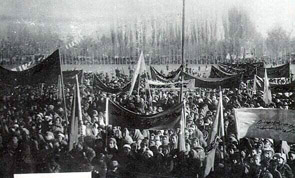 An
underground organization named ‘Ghulja Liberation
Organization’ was formed in the city of Ghulja with
the support and assistance of the Soviet Consulate in
Ghulja. The purpose of the organization was to oppose
the counterrevolutionary rule of the Sheng Shi-Cai and
Guo Ming Dang. Mr. Alihan Tore was the president. An
underground organization named ‘Ghulja Liberation
Organization’ was formed in the city of Ghulja with
the support and assistance of the Soviet Consulate in
Ghulja. The purpose of the organization was to oppose
the counterrevolutionary rule of the Sheng Shi-Cai and
Guo Ming Dang. Mr. Alihan Tore was the president.
The establishment of this organization was influenced
by a number of advanced individuals who were
knowledgeable in the philosophies of Marxism and
Leninism, and in the Chinese communist idea. The
organization was established after a long time spent
in preparation and promoting this advanced ideology
among all nationalities, the different classes, and
various political forces.
The leadership of the organization was complicated;
progressive intellectuals such as Ablikim Abbasof and
Kasimjan Kamberi made up a small proportion of the
leading body, while the majority consisted of highly
religious individuals such as Alihan Tore and
Muhamedjan Mahsum, along with rich businessmen, farm
owners, and landlords.
After establishment, Ablikim Abbasof and others worked
to spread ideas of opposition towards Sheng Shi-Cai
and Guo Ming Dang rule among progressive intellectuals
and youths. Alihan Tore and others organized secret
activities among high level religious individuals. The
Baidulla Mosque was used as headquarters for their
activities. Through the use of religious ceremonies,
they spread propaganda to oppose Sheng Shi-Cai and Guo
Ming Dang rule; in addition, they also promoted
pan-Islamic, pan-Turkic and national separatist ideas
among minority nationalities. By describing Sheng
Shi-Cai and Guo Ming Dang oppression of minority
nationalities as a result of the ‘Rule of the Han’,
they called for a struggle against the Han and
promoted the idea to get rid of the Han people. They
advocated a ‘holy war’ against the Han. They also
advocated separatism and independence by distorting
the history of Xinjiang.
April 10, 1944.
American president Franklin Roosevelt sent a telegram
to Chinese president Chiang Kai-Shi, urging Chiang to
take the overall mindset of the contemporary world,
which was currently against fascism, into
consideration, and to soften the China’s tense
relationship with the USSR in relation to the Xinjiang
issue so that the international community could gain
the USSR support against fascism.
April, 1944.
The Altai guerrilla was formed along the Burgin river
with Sulubay as the commander in chief.
June 10, 1944.
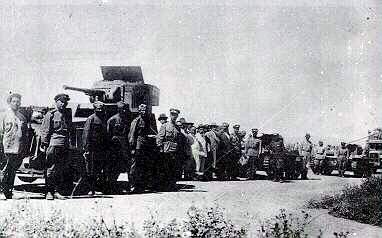
Joseph Stalin met with American
ambassador Hallman. He indicated that it was important
to dismiss Sheng Shi-Cai’s government position in
order to improve the Sino-Soviet relationship.
August 20, 1944.
The first victory of Ulastay Guerrilla against Guo
Ming Dang forces encouraged many people to join the
guerrilla force. The guerrilla forces made their first
major reform by forming three brigades with more than
200 soldiers and 60 rifles. Patih Mosilmof was the
commander of guerrilla.
November 12, 1944.
The Ghulja Liberation Organization held a conference
in the “Uighur, Kazakh and Kirghiz Club” and announced
the establishment of the Eastern Turkistan Republic.
The conference announced the national Flag of ET.
Alihan Tore was elected as the president, Hakimbek
Hoja, Abdurup Mahsum, Rahimjan Sabirhaji, Muhamatjan
Mahsum, Abdukerim Abasof, Hibib Ghunchef, Anwar Musa,
Pavil Povloviq, Abduhayir Tore, Gheni Yoldash,
Salijanbay Babajan, Abdumutaghrip, Peter Alexanderof
and Gheni were elected as the governing body of the
Republic. Akimbek Hoja was elected as the vice
president, and Abdurup Mahsum was elected as the
general secretary of the state.
November 19, 1944
The ETR Ministry of Education was established with
Hibib Ghunchef as minister and Sayfidin Aziz as vice
minister.
November 1944
The ETR Ministry of Inner Affairs was established with
Abdukerim Abasof as minister.
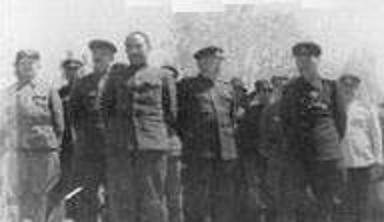 December
1944 December
1944
The ETR Supreme Court was established with Muhametjan
Mahsum as supreme justice.
December 1944
The ETR Ministry of Propaganda was established with
Abdukerim Abasuf as minister.
January 1, 1945
The ETR Ministry of Health was established with
Kasimjan Kamberi as minister.
January 5, 1945
 The
ETR government decided to develop trade with the USSR
to export animal and other agricultural goods, with
taxation on imports and exports. The Department of
Finance was given the power of making decisions on the
specifics of taxation methods, areas and amounts. The
ETR government decided to develop trade with the USSR
to export animal and other agricultural goods, with
taxation on imports and exports. The Department of
Finance was given the power of making decisions on the
specifics of taxation methods, areas and amounts.
January 5, 1945
At the Fourth Congress of ETR, the government
announced its goals to:
1. Completely wipe out the dictatorship of China in
the territory of Eastern Turkistan;
2. Establish a truly free and independent country on
the basis of equality to all nationalities in Eastern
Turkistan.
3. Develop industry, agriculture and animal husbandry
in order to improve the Eastern Turkistan economy and
raise living standards of the people.
4. Particularly promote Islam, since the majority of
the people of Eastern Turkistan were followers of
Islam. However, religious freedom would be protected
for all other religions.
5. Improve culture, education, and health care in ETR.
6. Establish a friendly relationship with all
democratic countries in the world, paying special
attention to the relationship with ETR's neighboring
Soviet Union, while at the same time promoting
political and economical relationship with China.
7. Establish a strong army by attracting all
nationalities in order to protect the peace in ETR.
8. Retain the ETR government ownership of all banks,
post offices, telephone and telegraph systems, forests
and all underground resources.
9. Eliminate selfishness, nationalist ideas and
corruption among employees in the nation.
 January
5, 1945 January
5, 1945
The ETR Ministry of Finance was established with Anwar
Musabaef as minister.
January 11, 1945
The American ambassador in Urumqi, Walter, paid a
visit to Wu Zhong-Xin; he expressed a deep interest in
learning the details of the ‘Ghulja Event’ for the
purpose of publishing the news in the American media
and eventually publicize the event to the world.
January 12, 1945
The ETR government announced the establishment of a
Ministry of Military with Peter
Alexanderof assigned as the minister.
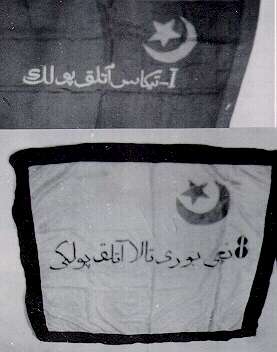 January
16, 1945 January
16, 1945
The ETR government passed the so-called Number Eight
legislation determined to (1) establish the bureau of
cultural and historical relics within the Ministry of
Education with the responsibility of protecting
cultural and historical antiques, and (2) establish a
general hospital, a general pharmacy and the
Department of Healthcare.
February 4-11, 1945
The leaders of the USA, UK and USSR (Roosevelt,
Churchill and Stalin, respectively), held a summit in
Yalta and signed so-called ‘Yarta Secret Treaty’.
 February
1945 February
1945
The ETR government appointed Zunun Tiyipof as the vice
chairman of the National Supervisory Committee.
March 3, 1945
The Ministry of National Inspection was established
with Zunun Teyipof as minister.
March 13, 1945
The Ministry of Land and Water was established with
Sarijanbay Babajan as minister.
April 13, 1945
Jiang Jie-Shi Jieshi's son Jiang Jing-Guo came to
Urumqi with Jiang's handwritten letter. He discussed
Xinjiang's issue with Wu Zhong-Xin and suggested using
minorities to handle Xinjiang affairs. He recommended
assigning local nationalities to vice presidential or
head of province departments. During the time in
Urumqi, Jiang Jing-Guo also talked with Soviet
officials about the relationship between the Soviet
Union and Xinjiang.
May 28, 1945
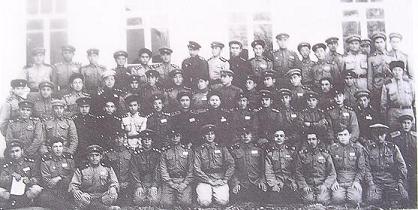
Josoph Stalin indicated to the
American president Truman’s special envoy, Hopkins,
that if China could comply with the conditions in the
‘Yarta Secret Agreement,’ the Soviet would declare war
with Japan and send troops to Manchuria to fight
against the Japanese army. He also noted that he would
fully support Jiang Jieshi aim to unify China, and
assert that the Soviet Union had no territorial
demands in China, either in Xinjiang or elsewhere.
May 28, 1945
Chinese president Chiang Kaishi called a special
meeting in the city of Chong Qing to discuss issues
related to bilateral talks between the Chinese and the
Soviet Union. It was decided that if the Soviet
government could guarantee the Chinese government’s
territorial claims on the North-East and Xinjiang
provinces, and stop supporting ‘Xinjiang Turmoil’, the
Chinese would consider demands from the Soviet Union
about ‘Outer Mongolia’ (i.e. recognize the
independence of the Mongolian People’s Republic).
Jiang Jie-Shi sent two secret telegraphs to Sun Zi-Wen,
who was in the negotiation process with Soviet
government officials. In the telegraphs, Jiang ordered:
We will recognize Outer Mongolian independence after
the war, but the Soviet Union has to admit the "North-East”
(Mancuria) and Xinjiang as Chinese territories, and
has to promise not to support the turmoil in Xinjiang.
June 20, 1945
The Head of the Department of Legislation and the
minister of Foreign Affairs of the Guo Ming Dang
government, Sun Zi-Wen, met Wu Zhong-Xin in Chong Qing
to talk about the current event in Xinjiang. He
determined to go to Moscow with Liu Ze-Rong.
June 29, 1945
The American ambassador in Urumqi, Walter, visited Wu
Zhongxin and asked about the current events in Gulja.
He also informed Wu that American president Truman had
already sent the special envoy Hopkins to Moscow,
therefore the ‘Ghulja Event’ should be under control.
July 17, 1945
Jiang Jie-Shi ordered Zhu Shao-Liang and Wu Zhong-Xin
to get ready to recover the Ili district in October.
Zhu and Wu believed that the negotiations between
Stalin and Sun Zi-Wen about the event in Xinjiang
would reach a conclusion once the foreign relations
between the two countries improved, then the Chinese
will use political methods to “recover” the Ili
district.
August 13, 1945
The Guo Ming Dang government foreign minister Wang
Shi-Jie and the Soviet Union foreign minister Molotof
signed the ‘Friendship Agreement between China and
Soviet Union’ and all supplementary documents. In one
of the attached documents, the Guo Min Dang government
recognized the independence of “Outer Mongolia,” and
the Soviet government indicated: “Regarding to the
recent events in Xinjiang, the Soviet Union complies
with the 5th item of the ‘Agreement’ and has no
intention to intervene with China's inner affairs”
August 28, 1945
Mao Ze-Dong, Zhou En-Lai, Wang Ruo-Fei and several
other representatives flew to Chong Qing from Yan An
to attend the peace negotiations with Guo Ming Dang.
When talking about how to establish new a China after
the war with Japan, Mao Ze-Dong especially emphasized
the Chinese Communist Party's policy of supporting the
struggle for self determination of all nationalities
in Xinjiang. He requested the Guo Ming Dang government
to abandon the policy of racial discrimination and
suppression and find a peaceful solution to resolve
the Xinjiang problem.
September 10, 1945
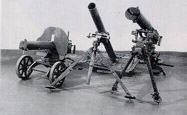 ETR's
army reached the west side of Manas River; the troops
were only 150 kilometers away from Urumqi, the capital
of Xinjiang. By that time, there were only six
battalions of Guo Ming Dang troops guarding Urumqi.
Zhu Shao-Liang sent three urgent telegraphs in eight
hours to Jiang Jie-Shi, asking for help. The
telegraphs said: “We are in a desperate situation, we
don't have suitable soldiers to fight, and we can't
get any help from outside. Urumqi will soon be taken
over by the enemy unless help is sent immediately.” ETR's
army reached the west side of Manas River; the troops
were only 150 kilometers away from Urumqi, the capital
of Xinjiang. By that time, there were only six
battalions of Guo Ming Dang troops guarding Urumqi.
Zhu Shao-Liang sent three urgent telegraphs in eight
hours to Jiang Jie-Shi, asking for help. The
telegraphs said: “We are in a desperate situation, we
don't have suitable soldiers to fight, and we can't
get any help from outside. Urumqi will soon be taken
over by the enemy unless help is sent immediately.”
September 13, 1945
Zhang Zhi-Zhong led the team consisting of Mahsut
Sabir (a Guo Mingdang Central Committee member), Deng
Wen-Xia (the first minister of the Political Bureau),
Aisa Yusuf (a Guo Ming Dang legislative representative),
Wang Zen-Shan, Zhan Jing-Yu and Muhamet Imin Bughra (a
Guo Ming Dang Central Committee Alternate Inspector),
and others flew to Urumqi. On the same night, the team
held a meeting with high ranking Xinjiang officials to
discuss military, political and foreign affairs in
Xinjiang. They all agreed that there was no way to
resolve the current problem by using military force,
and that the best way to resolve it politically was to
ask the Soviet Union to act as mediator.
October 2, 1945
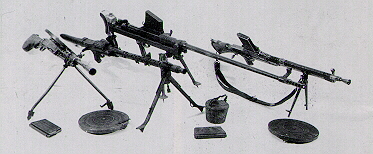
The ETR Government passed the
100th legislative decision, suggesting that the Guo
Ming Dang government implement a non-military solution
to negotiate the issue of the independence of “Eastern
Turkistan.” If the Guo Min Dang government had no
objections, the ETR government would soon send
Rahimjan Sabirhaji, Abduhayir Tore and Ahmetjan Kasim
as representatives to go to Urumqi for the negotiation.
September 16-27, 1945
The ETR army was ready to take over Kashgar’s old city;
troops were 50 kilometers away from the city center.
September 19, 1945
The Quqek district was liberated by the ETR army.
September 15, 1945
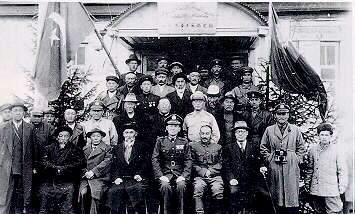
The Guo Mingdang government's
foreign minister Mr. Wang Shi Jie and Soviet Union
foreign minister Mr. Molotof discussed the expansion
of the “Xinjiang Ili Event” in London, England.
Molotof indicated that the event was going to be a
temporary one; it would not take too long to calm
down.
September 23, 1945
Alihan Tore organized a ETR government conference in
the Altay district and decided (1) the Altay district
was a part of the Eastern Turkistan Republic; (2) an
Altay districtal government and official divisions
would be established with Osman Islam assigned as the
Altay governor (3) Osman Islam, Dalilkhan Sughurbay,
Zakikhan Ali were elected as new committee members of
ETR government.
October 10, 1945
The ETR government passed the 103rd Resolution and
elected Ahmatjan Kasim as the committee member of ETR
government.
November 25, 1946
Ahmetjan Kasim was elected as a member of the National
Congress. During the congress meeting, Ahmetjan Kasim
and the other seven representatives handed over a
document asking for the renaming of the Xinjiang
Province to the “Eastern Turkistan Republic” and to
give the province the power of self-determination." On
the same day, Zhang Zhi-Zhong's article "My True
Answers and Serious Advice" was published. In the
article, Zhang pointed out: "Eastern Turkistan is only
a geographical name in written history. A name can not
be used as an appeal to split the motherland. The only
way for Xinjiang is autonomy (self-determination).
January 12, 1947
American reporter Estonis Babara went Ghulja from
Urumqi to investigate the ETR revolution. She visited
Hakimbek Hoja, Anwer Musabaef and Gheni during the
trip.
January 1947
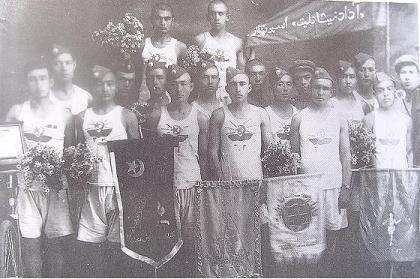
According to Zhang Zhi-Zhong's
order, Liu Meng-Chun held several meetings to discuss
a feasible solution to deal with Three Districts. They
decided to: (1) use an increased scale of propaganda
to stress Xinjiang as an inseparable part of China,
(2) organize Han, Hui, Kazakh, Kirghiz and other
nationalities against the Three Districts. At the same
time, to instigate Xibo, Solon and Man cultural clubs
to oppose the Three Districts.
www.meshrep.com |





 December
1944
December
1944  The
ETR government decided to develop trade with the USSR
to export animal and other agricultural goods, with
taxation on imports and exports. The Department of
Finance was given the power of making decisions on the
specifics of taxation methods, areas and amounts.
The
ETR government decided to develop trade with the USSR
to export animal and other agricultural goods, with
taxation on imports and exports. The Department of
Finance was given the power of making decisions on the
specifics of taxation methods, areas and amounts.  January
5, 1945
January
5, 1945  January
16, 1945
January
16, 1945 




